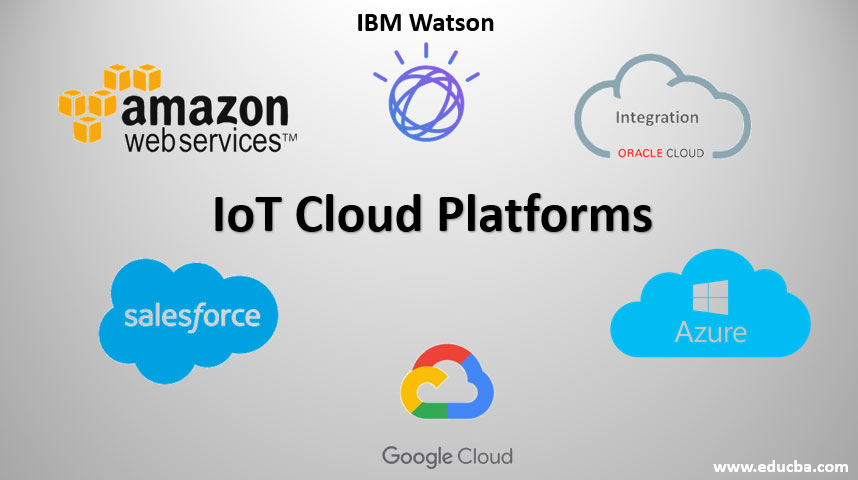Updated March 23, 2023
Introduction to IoT Cloud Platforms
IoT cloud platforms do the task of bringing together the capabilities of IoT devices and cloud platforms to perform end-to-end service. IoT device has multiple sensors and it is connected to the cloud via gateways. Various devices are connected to the internet and big data is processed through IoT devices and get connected to the multiple applications. IoT cloud is deployed in three different ways such as SaaS (software as a service), PaaS (platform as a service) and IaaS (infrastructure as a service). It is built on top of the other generic clouds such as Microsoft, Amazon, Google, etc. IoT cloud platforms do the task of stretching and analyzing data and process it through cloud and devices.
Cloud Platforms for the Internet of Things
Internet of things is the fastest growing industry today. Here we will look at the most recommended cloud platforms used for IoT development.
1. AWS IoT
There are billions of devices present in the hospital, homes, cars and N number of places. AWS helps the user to collect, store and analyze the device data even when internet connectivity is down. It provides services like AWS IoT Core, AWS IoT device management and AWS IoT device defender. AWS IoT analytics services are provided for analyzing their IoT data. It is scalable to use and pay for what you use. It provides security features such as encryption and access control devices, monitor and audit security policies. It is useful for connected homes, industrial and commercial projects and industrial applications like Anel company uses IoT platform for energy management (creating green glass enable gateways for homes, Symantec network uses IoT for the backend.
2. Microsoft Azure IoT Hub
Cloud computing is about accessing computing services like storage, networking over the internet from the service provider Azure. When we store photos online instead of phone gallery is cloud computing. It provides services for deploying applications on a massive global network using preferred tools and frameworks. It is used for meeting business challenges. It is a Microsoft product, less expensive to use, more secure and reliable. We can scale up and down storage resources when our needs change on azure. It will manage tools and services for hybrid cloud applications. We can build a framework with all the languages and can deploy wherever we want. Help is provided by the expert while using azure.
3. Salesforce IoT
Building an application takes a lot of time but with the help of salesforce, it becomes easy and less time consuming because it provides the fastest path from thinking of creating an app to building it successfully. No need to worry about infrastructure and tools. It is available in the cloud, anyone can use it from anywhere through the internet. It is scalable to the growth of the company which is seasonally changing it is applications. It supports start-ups and small businesses. It provides software solutions and platforms for users and developers. Infrastructure and up-gradation happen automatically. Sales cloud, service cloud, exact target market cloud, app exchange are services provided to the customers. Organizations can store and process Internet of things data, can utilize services provided by the salesforce IoT cloud. Salesforce handles a massive amount of data generated by devices, websites, sensors, etc and provides responsive actions to the data provided by customers.
4. Google Cloud IoT
It is used for collecting, processing and analyzing data and store at the edge and in the cloud. It is a scalable and fully-managed cloud service. With the help services provided by google cloud IoT data, we can get an insight into the business. Ad hoc analysis is done with the help of Google BigQuery. We discover about device performance on the Google Cloud IoT platform. We can make use of Google Maps to visualize real-time location the asset and keep track of them. It provides security with less risk. It has intelligent monitoring and control for the assets.
5. IBM Watson IoT Platform
It is a cloud-hosted service that is capable of registration, connectivity, control, rapid visualization and data storage. We can get real-time analysis of user and machine data such as speech, text video using the smart and scalable platform. This will help us to make better business decisions. It can connect IoT devices, networks and gateways through ecosystems (it uses standard-based communications like HTTPS). It performs analysis of structured and unstructured data. We can get history and parse, transform our data. The integration of IoT apps is possible.
6. Oracle Integrated Cloud for IoT
Oracle IoT is the SaaS solution that is built on highly scalable IoT platforms that runs on Oracle-based cloud infrastructure. It has built-in integrations and extensibility features to extend our business such as ERP. It will provide real-time insight into the data to improve efficiency and derive business values from applications. Security is highly available such as each device has a unique identity and authorization of proof-origin data. Multiple devices are connected to enterprise applications with REST API’s. It has built-in intelligence and machine learning capabilities to build intelligent IoT solutions.
Conclusion
We have learned about IoT cloud computing, how it will help the business to grow in the 20’s era where competition is getting tougher for services provided to the users. Types of IoT clouds available to the users. Different IoT cloud provides different features but one common thing is there about different cloud and that is security and privacy of user data. This will help the company to build user’s trust.
Recommended Articles
This is a guide to IoT Cloud Platforms. Here we discuss the Introduction to IoT Cloud Platforms and the most recommended Cloud platforms used for IoT development. You can also go through our suggested articles to learn more –



